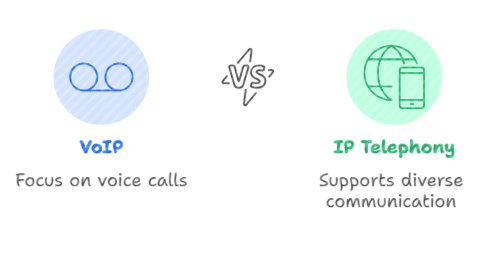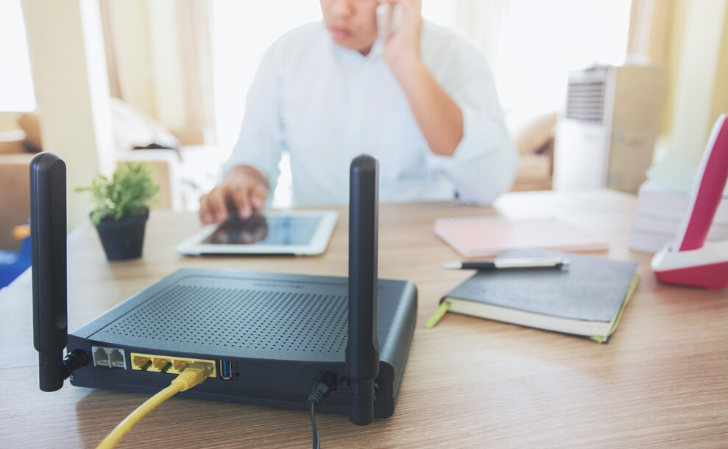Business communication has advanced from traditional phone lines to internet-based tools over the years. These solutions are far more efficient and flexible than the previously prevalent analogue phones. Especially when the technology that supports landline phones is set to be wiped off by 2027 (PMC Telecom) in the UK, businesses are actively switching to alternatives like VoIP and IP telephony.
Both of these terms are often used interchangeably so it’s no surprise that users get confused. To choose the best option for your business, it is important to understand the differences between both. In this blog, we’ll break down their differences, working and benefits and answer some of the most asked questions at the end.
What is VoIP?
VoIP stands for voice over Internet protocol. It’s a communication channel that uses the internet to send and receive voice calls. Unlike traditional landline phones that change your audio to an electric signal, VoIP transmits your voice by converting it to digital signals that travel via the internet in the form of packets. This system also eliminates the need to set up a physical infrastructure, as needed for traditional phones before.
To set up a basic VoIP system, you need the following equipment:
- A router (for an internet connection).
- A phone set (could be software or hardware VoIP phone).
- A VoIP package from a trusted provider.
Compare VoIP Phone System Quotes Today
How does VoIP work?
Now that a basic VoIP system is set up with an internet connection, a compatible device, and a VoIP package, we need to understand how it actually works.
Here are the steps that take place during the working of a VoIP system:
- On the dialer’s end: When a call is made over VoIP, the voice signals are converted into digital ones.
- At the VoIP network: These digital signals are then sent to the network of your VoIP provider. Here, the signals are converted into “internet packets,” which are sent to the receiver’s end. These data packets transfer data efficiently using less bandwidth.
- On the receiver’s end: When the digital packets reach their destination, they are converted back to analogue signals. At this point, your voice is successfully transmitted over a VoIP call.
What is IP telephony?

IP telephony is a broader term that refers to various internet-based communication channels along with the hardware needed to support them. It includes messages, voice calls (VoIP), video calls, messaging, faxing, conferencing, and IP phones. Simply put, when someone refers to VoIP, they are specifically talking about voice calls over the internet. However, IP telephony is a complete communication network that includes voice calls along with other channels.
Major differences: VoIP vs IP telephony
Even though the terminologies VoIP (Voice over Internet Protocol) and IP telephony are often used to mean the same thing, they are not identical. VoIP (Voice over Internet Protocol) mainly consists of technology that allows sending and receiving voice calls over the Internet. On the other hand, IP telephony is a broader term that includes not just voice calls but also other internet-based communication channels (video calls, and messaging) and the hardware required to set up the system.
The common aspect between both technologies is the use of the internet to communicate. This overlap causes many people to refer to VoIP and IP telephony as the same thing, which ultimately leads to confusion. In casual conversations, people don’t necessarily mind the distinction and refer to all types of internet-based communication as VoIP. However, in business and professional settings, it is best to use the appropriate term for the relevant services to communicate clearly.

In short, VoIP is a part of IP telephony. All VoIP calls are a form of IP telephony, but IP telephony includes more than just voice calls.
Benefits of VoIP and IP Telephony

Let us discuss some of the advantages and disadvantages of VoIP and IP telephony in detail.
Cost efficient
VoIP systems and IP telephony are both highly affordable options as compared to the traditionally available landline phone systems. When signing up for a VoIP package, you can expect to pay anywhere from £7- £10. This basic package falls in an affordable price range for all types of businesses.
Highly portable
When you sign up for a VoIP system, you receive a virtual IP phone number. This virtual phone number is portable and can be used on any device that can be connected to the internet (be it a smartphone, laptop, or tablet). If you buy an IP phone to connect to the VoIP system, the portability factor remains there. As it doesn’t need to be connected to a fixed spot to operate.
Grows with your business
VoIP and IP telephony systems grow as your business grows. Whether your growth is seasonal or permanent, the ease of expanding your system remains consistent. To add more users to your system, simply contact your VoIP provider to install new virtual lines. Similarly scaling down your system is also a straightforward process.
Find the Best VoIP Provider for Your Business In The UK With ComparedBusiness
Now that you have a clear idea of VoIP and IP telephony, it is time to find a reliable provider to meet your communication needs. Finding the right VoIP provider for your business can be overwhelming but we are here to make it simple for you. We at ComparedBusiness are experts in linking businesses with VoIP phone service providers. Just submit your business details in less than 2 minutes and we will get back to you with quotes from a list of reliable VoIP providers in the UK.
FAQs
VoIP system is an internet-based communication channel. Just access to an internet connection and VoIP software allows you to make voice calls at cheaper rates than traditional landlines.
Yes. According to resources, the UK’s technology that supports landline phones will be switched off by 2027. The reason is mainly due to the difficulty in maintaining the infrastructure required for the operation of these systems. However, alternative options including VoIP are easily accessible in the market. If you haven’t made the switch yet, ComparedBusiness can help you connect with top VoIP providers.
IP telephony includes various communication channels like voice calls, video calls, text messaging, conferencing and more entirely based on the internet.
Internet connectivity always brings about certain security risks. As with VoIP, there are possible risks of data leakage, call hijacking and eavesdropping attacks. But with necessary security measures (encryption methods, updated software, double authentication) these risks are eliminated.












